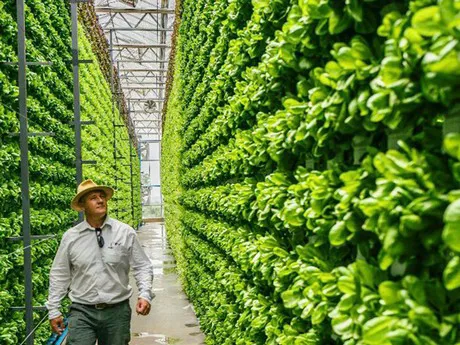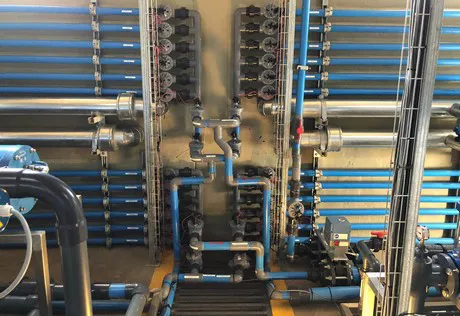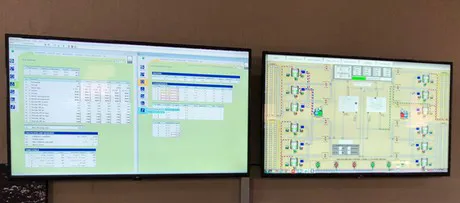“The truly sustainable vertical farm of the future shouldn’t be a compromise. The power of natural sunlight is essential,” says François van der Merwe, CEO of CAN-Agri. François has some innovative ideas about today’s vertical farms: “As I see it, most ‘vertical farms’ are not actually vertical. They are made up of horizontal layers that have been stacked vertically, and the top layer blocks out the sun for the layers below. It’s a crying shame that we don’t make optimal use of the power of natural sunlight.” That realization prompted François and his business partner Gideo van der Merwe to develop a truly vertical crop production system that requires hardly any artificial light. They have rotated the traditionally horizontal layers through 90 degrees. François: “This allows each plant to get the necessary light from a naturally occurring source: the sun.”

François van der Merwe (CAN-Agri) amidst the vertical plant walls for the production of various types of lettuce.
Optimal use of the sun
François and Gideo live in South Africa, where there is an abundance of sunlight. “Here in South Africa we couldn’t understand why you would want to use artificial light instead of sunshine. It’s such a waste of energy – and there’s a free supply of sun!” CAN-Agri’s current production facility, which is based in the South African city of Pretoria, looks very different from a typical greenhouse. It comprises rows of vertical ‘plant walls’ that are strategically placed in the greenhouse with ample space in between them so that the whole of each wall receives plenty of sunlight. "We are aware that there are locations in the world where supplementary lightning is unavoidable. We apply this where necessary, but it is important to harness the sun energy when and where it is available," explains François.
Unique closed-loop water system
Besides saving energy by tapping into the power of sunlight, at CAN-Agri they also make smart use of their irrigation water. In conjunction with Priva, François and Gideo have developed a concept for the safe reuse of all the irrigation water and the high-value fertilizers it contains. The concept is based on an irrigation system that pre-treats the water, doses the fertilizers and then disinfects the irrigation water afterwards.
The design phase was not without its challenges. “The water system at CAN-Agri is more complex that most. Whereas most growers largely have a monoculture with just one or two water storage tanks for their daily supply, at CAN-Agri they work with lots of smaller tanks,” explains Kees van der Kruk, Product Manager at Priva. “This enables them to adjust the nutrient levels and pH values based on the specific needs of whichever variety is being grown in a particular area of the greenhouse. Another advantage of this kind of modular system is that it keeps the drainage water from the various crops separate, which minimizes the risk of cross-contamination between the systems in the case of a waterborne disease.” To completely eliminate the risk of contamination, the Priva Vialux M-Line disinfects all the water from the storage tanks to kill all bacteria, viruses and other pathogens.
 Pipes leading from the various water tanks.
Pipes leading from the various water tanks.
Optimizing production
The greenhouse technology includes an integrated Priva Connext process computer to keep the closed-loop water system and all the other processes running automatically, reliably and on schedule. The CAN-Agri solution places considerable demands on Connext in terms of process automation. Due to the large number of water storage tanks, the process computer is continuously calculating new priorities and making the necessary adjustments. “A fully automated irrigation process – from fertilizer dosing to pre-treatment and post-treatment of the irrigation water – gives growers more time to focus on optimizing production,” continues Kees.

A diagram of the water system controlled by the Connext process computer.
The right people on board
François is actually an architect by trade, but his initial lack of experience in the horticultural sector created opportunities rather than threats. François: “My background in construction came in very useful when designing this system. Gideo and I were able to bring the right people on board so we didn’t have to ‘reinvent the wheel’.” Over the past four years, CAN-Agri’s concept has evolved to today’s commercial scale. “Thanks to all the research we’ve done, we have an excellent understanding of the technology, what works and what doesn’t, and what we still need to optimize.”
The next step for CAN-Agri is to implement the technology as a business model for growers worldwide. “Our solution isn’t a ‘farm in a box’. No two projects are the same, so the advisory phase is a very important part of our approach. That’s when we assess the current labor, water and energy costs and evaluate whether it makes financial sense to implement our business model for that particular project. So we see ourselves as a service provider that continuously works together with the customer, our own R&D department and technology partners such as Priva.”
For more information:
Priva
www.priva.com
contact.priva@priva.nl

